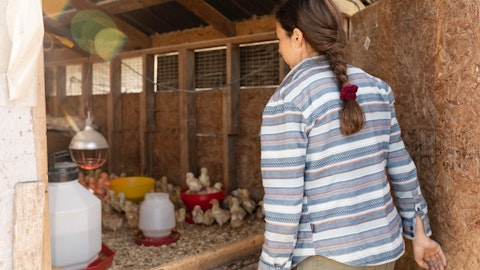Peter Benedict: Hey guys, thanks. Kurt, just leveraging off Steve’s question there, the prudent investment approach on the CapEx side. Can you walk that over to the SG&A side of the P&L and talk about what it kind of means? You’ve spoken to 85% of the growth in SG&A coming from some of these investments. How does that kind of – maybe that growth cadence inflect next year? And then secondly, your ability to kind of manage the core bucket, I guess the non-investment related bucket in the event that your comps remain challenged, let’s say through ‘24. Let’s just call it flat for argument’s sake. Thank you.
Kurt Barton: Yeah, Peter. On SG&A, as I mentioned in my prepared remarks, I felt one of the highlights was how the team managed pivoting off of a number of years and quarters with strong top line sales, to scale to the appropriate level of volume for Q3. And it just shows our ability to be agile in that case. To your point on the 85% was growth, some of the things that really played out to help drive the core SG&A to a really low growth level. First area, supply chain, and I mentioned this in the previous last couple quarters. We had built the supply chain almost through muscle, 3PL, other areas that distribution centers were running at max capacity or above that level and that was inefficient. We’ve been able to shut off some of the 3PL higher costs.
The team is running at some of the highest level of productivity. So one of our biggest areas of leverage in a flat to slight negative comp sales environment was our distribution supply chain, as they actually leveraged as a percent of sales because of productivity. John and team focusing on scaling down task or non-customer service work to modestly drive hours down, that also reflects some of the SG&A benefits. In general, in an environment that there is softer demand at Tractor Supply, as we look ahead to even future quarters and next year, we’ll plan and scale our core levels of investments and our operating expenses in line with our sales growth. And then from there, this team will continue to claw back inflationary pressures, even in operating expenses that have embedded over the last few years.
And this is a team that’s been built with lean management, continuous improvement in our DNA, and we have profit improvement goals. And those are all things as we plan ahead to 2024 that gives us confidence in our ability to manage and still hold to our long-term algorithm and targets on operating margin.
Peter Benedict: Thank you very much.
Operator: Thank you. The next question comes from the line of Michael Baker with DA Davidson. Your line is now open.
Michael Baker : Excuse me, thanks. Two-part question, I guess. I wanted to ask about your discretionary and seasonal business. You talk about your discretionary business being 15% of sales, but why wouldn’t you consider the seasonal business to be discretionary, as well as that seems to be able to ebb and flow based on the seasons? And I guess the second part of that is, you said the fall/early winter businesses start off slow. Are those loss sales or just delayed? Like, if it does eventually get cold, which presumably it will, how do you think those sales pick back up?
Hal Lawton: Yeah, hey Michael, good morning. Thanks for the question. Appreciate your participation in the call. You know, as it relates to discretionary, just one would acknowledge 15%-ish of our business kind of big ticket discretionary, mid-single digit negative comps, a slight improvement from sequentially from what we saw in the first half of the year, kind of in line with what we expected. The myth throughout the entirety of this year for us has been our seasonal businesses. Our CUE business continues to perform very strong, with comps well above our reported total company comp performance with significant share gains happening in our CUE business. On our Q2 call or Q1 and Q2 calls, when we talked about seasonal, we acknowledged that there could be an element of the consumer spending discretionary piece that kind of seeps into that seasonal business.




